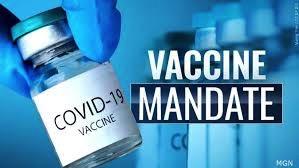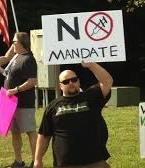 In 1777 General George Washington issued a mandate to vaccinate the Revolutionary Army against smallpox despite an anticipated two percent fatality rate from the crude vaccine used. The preemptive action allowed training to proceed and preserved the readiness of the army to save the United States. Receiving a smallpox vaccine was both patriotic and a recognized measure to preserve life and prevent the complications of the disease.
In 1777 General George Washington issued a mandate to vaccinate the Revolutionary Army against smallpox despite an anticipated two percent fatality rate from the crude vaccine used. The preemptive action allowed training to proceed and preserved the readiness of the army to save the United States. Receiving a smallpox vaccine was both patriotic and a recognized measure to preserve life and prevent the complications of the disease.
 Despite legal challenge to vaccine mandates, most states have over the years required school children to be protected against a wide range of diseases. Vaccination has effectively eradicated many childhood diseases in the U.S. The need to continue to vaccinate populations is illustrated by the frequent upsurge in cases of measles as a result of vaccine rejection by various religious sects. In Staphorst a town with a population of 10,000 in the Netherlands experienced an outbreak of poliomyelitis affecting 38 children within a strict Calvinist sect. The outbreak only ceased following compulsory vaccination. The military has for decades imposed vaccine mandates to maintain operational readiness among armed forces deployed to areas where a number of serious infections are prevalent.
Despite legal challenge to vaccine mandates, most states have over the years required school children to be protected against a wide range of diseases. Vaccination has effectively eradicated many childhood diseases in the U.S. The need to continue to vaccinate populations is illustrated by the frequent upsurge in cases of measles as a result of vaccine rejection by various religious sects. In Staphorst a town with a population of 10,000 in the Netherlands experienced an outbreak of poliomyelitis affecting 38 children within a strict Calvinist sect. The outbreak only ceased following compulsory vaccination. The military has for decades imposed vaccine mandates to maintain operational readiness among armed forces deployed to areas where a number of serious infections are prevalent.
The recent round of COVID vaccination mandates issued by the Administration, hospital chains, and commercial firms are justified given the need to protect workers from infection by unvaccinated colleagues. Vaccine refusal among healthcare workers and those coming into contact with the elderly is unconscionable. There is no “right to infect” as Justice John Marshall Harlan ruled in 1905 stating that the Constitution did not sanction Americans to behave individually as they chose. In his ruling dealing with a smallpox vaccine mandate he stated, “Real liberty for all could not exist if people could act regardless of the injury that may be done to others.”